大医精诚英语翻译
《大医精诚》译文
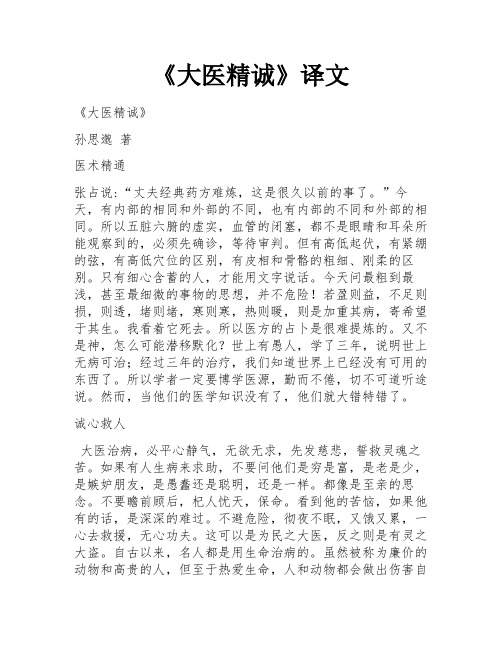
《大医精诚》译文《大医精诚》孙思邈著医术精通张占说:“丈夫经典药方难炼,这是很久以前的事了。
”今天,有内部的相同和外部的不同,也有内部的不同和外部的相同。
所以五脏六腑的虚实,血管的闭塞,都不是眼睛和耳朵所能观察到的,必须先确诊,等待审判。
但有高低起伏,有紧绷的弦,有高低穴位的区别,有皮相和骨骼的粗细、刚柔的区别。
只有细心含蓄的人,才能用文字说话。
今天问最粗到最浅,甚至最细微的事物的思想,并不危险!若盈则益,不足则损,则透,堵则堵,寒则寒,热则暖,则是加重其病,寄希望于其生。
我看着它死去。
所以医方的占卜是很难提炼的。
又不是神,怎么可能潜移默化?世上有愚人,学了三年,说明世上无病可治;经过三年的治疗,我们知道世界上已经没有可用的东西了。
所以学者一定要博学医源,勤而不倦,切不可道听途说。
然而,当他们的医学知识没有了,他们就大错特错了。
诚心救人大医治病,必平心静气,无欲无求,先发慈悲,誓救灵魂之苦。
如果有人生病来求助,不要问他们是穷是富,是老是少,是嫉妒朋友,是愚蠢还是聪明,还是一样。
都像是至亲的思念。
不要瞻前顾后,杞人忧天,保命。
看到他的苦恼,如果他有的话,是深深的难过。
不避危险,彻夜不眠,又饿又累,一心去救援,无心功夫。
这可以是为民之大医,反之则是有灵之大盗。
自古以来,名人都是用生命治病的。
虽然被称为廉价的动物和高贵的人,但至于热爱生命,人和动物都会做出伤害自己的事情,一切都会遭遇同样的境遇。
丈夫为了生存而杀人,走得更远。
今天我来了,所以不需要以命为药的都好。
它属于蝇类和水蛭类。
如果城市里有第一个死去的人,城市会使用他们,而不是在这种情况下。
就像一个鸡蛋,混沌未分,肯定有很多要焦虑的,所以我们要承受它,利用它。
如果你不能使用它,它是伟大的哲学家所不能及的。
我的志向是,有些人生疮、腹泻、恶臭,被别人讨厌,却觉得羞耻、难过、烦恼,不应该去想这些。
大医之体医生的身体,如果你想有一个清晰的视野,看起来是这样的。
《大医精诚》全文及白话译文

《大医精诚》全文及白话译文英文回答:The Great Physician's Essential Qualities.The Great Physician's Essential Qualities is an ancient Chinese medical treatise that emphasizes the virtues and conduct that a physician should possess. Written by the renowned physician Sun Simiao during the Tang dynasty, it has served as a moral and ethical guideline for medical practitioners for centuries. The treatise consists of nine chapters, each focusing on a specific aspect of aphysician's character and practice.Chapter 1: Universal Love and Compassion.The first chapter highlights the importance of universal love and compassion for patients. Sun Simiao emphasizes that a physician should treat all patients with equal care and concern, regardless of their social status,wealth, or background. He implores physicians to see beyond the superficial differences and focus on the underlying humanity of each patient.Chapter 2: Unselfishness and Sacrifice.The second chapter calls for physicians to be selfless and willing to sacrifice their own interests for the well-being of their patients. Sun Simiao stresses that a physician should never put personal gain or financial rewards above the health and recovery of their patients. He encourages them to be humble and to serve with a pure heart.Chapter 3: Uprightness and Integrity.The third chapter emphasizes the importance of uprightness and integrity in medical practice. Sun Simiao warns against unethical practices such as giving false diagnoses, withholding information, or accepting bribes. He implores physicians to be honest, forthright, and transparent in their dealings with patients and colleagues.Chapter 4: Skill and Diligence.The fourth chapter highlights the need for physicians to possess exceptional skill and diligence. Sun Simiao stresses the importance of continuous learning and striving for excellence. He exhorts physicians to constantly seek new knowledge and techniques to provide the best possible care for their patients.Chapter 5: Humility and Respect.The fifth chapter encourages physicians to maintain humility and respect in their interactions with patients and colleagues. Sun Simiao cautions against arrogance and vanity, and implores physicians to listen attentively to their patients and to value the opinions of experienced practitioners.Chapter 6: Caution and Attentiveness.The sixth chapter emphasizes the importance of caution and attentiveness in medical practice. Sun Simiao warnsagainst rushing to conclusions or making hasty decisions.He encourages physicians to be thorough in theirexamination and diagnosis, and to consider all possible factors that could affect the patient's health and recovery.Chapter 7: Patience and Perseverance.The seventh chapter underscores the need for physicians to possess patience and perseverance. Sun Simiao recognizes that medical treatment can be a long and challenging process, and he implores physicians to remain committed to their patients throughout the journey. He encourages themto provide comfort and support, and to never give up on those who seek their care.Chapter 8: Continuous Learning and Self-Improvement.The eighth chapter emphasizes the importance of continuous learning and self-improvement for physicians.Sun Simiao urges them to stay abreast of medical advancements and to seek opportunities for personal and professional growth. He believes that complacency andstagnation can lead to mediocrity and harm to patients.Chapter 9: Longevity and Spiritual Attainment.The ninth and final chapter explores the relationship between medical practice and longevity and spiritual attainment. Sun Simiao sees the practice of medicine as an opportunity to cultivate virtue and wisdom, and he encourages physicians to seek a balance between their professional and spiritual lives. He believes that physicians who live harmoniously and have a deep understanding of life can achieve both physical and spiritual longevity.中文回答:大医精诚。
大医精诚 整篇翻译及作者简介
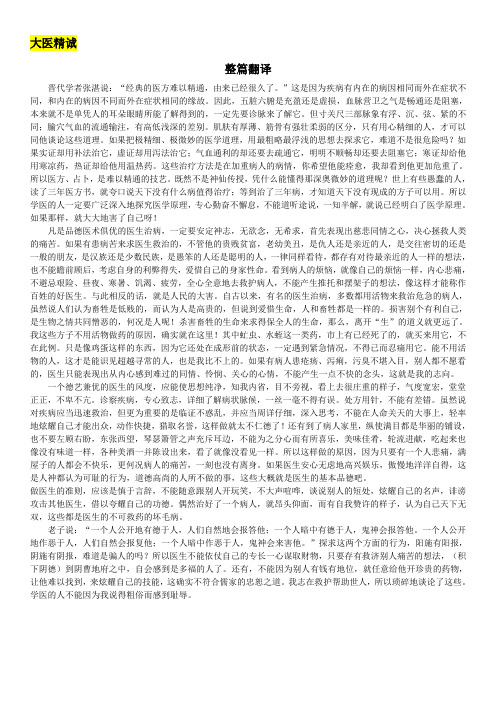
大医精诚整篇翻译晋代学者张湛说:“经典的医方难以精通,由来已经很久了。
”这是因为疾病有内在的病因相同而外在症状不同,和内在的病因不同而外在症状相同的缘故。
因此,五脏六腑是充盈还是虚损,血脉营卫之气是畅通还是阻塞,本来就不是单凭人的耳朵眼睛所能了解得到的,一定先要诊脉来了解它。
但寸关尺三部脉象有浮、沉、弦、紧的不同;腧穴气血的流通输注,有高低浅深的差别。
肌肤有厚薄、筋骨有强壮柔弱的区分,只有用心精细的人,才可以同他谈论这些道理。
如果把极精细、极微妙的医学道理,用最粗略最浮浅的思想去探求它,难道不是很危险吗?如果实证却用补法治它,虚证却用泻法治它;气血通利的却还要去疏通它,明明不顺畅却还要去阻塞它;寒证却给他用寒凉药,热证却给他用温热药。
这些治疗方法是在加重病人的病情,你希望他能痊愈,我却看到他更加危重了。
所以医方、占卜,是难以精通的技艺。
既然不是神仙传授,凭什么能懂得那深奥微妙的道理呢?世上有些愚蠢的人,读了三年医方书,就夸口说天下没有什么病值得治疗;等到治了三年病,才知道天下没有现成的方子可以用。
所以学医的人一定要广泛深入地探究医学原理,专心勤奋不懈怠,不能道听途说,一知半解,就说已经明白了医学原理。
如果那样,就大大地害了自己呀!凡是品德医术俱优的医生治病,一定要安定神志,无欲念,无希求,首先表现出慈悲同情之心,决心拯救人类的痛苦。
如果有患病苦来求医生救治的,不管他的贵贱贫富,老幼美丑,是仇人还是亲近的人,是交往密切的还是一般的朋友,是汉族还是少数民族,是愚笨的人还是聪明的人,一律同样看待,都存有对待最亲近的人一样的想法,也不能瞻前顾后,考虑自身的利弊得失,爱惜自己的身家性命。
看到病人的烦恼,就像自己的烦恼一样,内心悲痛,不避忌艰险、昼夜、寒暑、饥渴、疲劳,全心全意地去救护病人,不能产生推托和摆架子的想法,像这样才能称作百姓的好医生。
与此相反的话,就是人民的大害。
自古以来,有名的医生治病,多数都用活物来救治危急的病人,虽然说人们认为畜牲是低贱的,而认为人是高贵的,但说到爱惜生命,人和畜牲都是一样的。
大医精诚原文及翻译
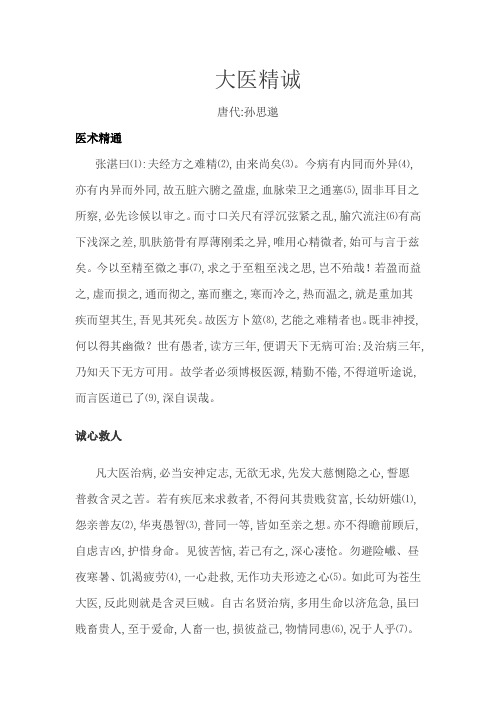
大医精诚唐代:孙思邈医术精通张湛曰⑴:夫经方之难精⑵,由来尚矣⑶。
今病有内同而外异⑷,亦有内异而外同,故五脏六腑之盈虚,血脉荣卫之通塞⑸,固非耳目之所察,必先诊候以审之。
而寸口关尺有浮沉弦紧之乱,腧穴流注⑹有高下浅深之差,肌肤筋骨有厚薄刚柔之异,唯用心精微者,始可与言于兹矣。
今以至精至微之事⑺,求之于至粗至浅之思,岂不殆哉!若盈而益之,虚而损之,通而彻之,塞而壅之,寒而冷之,热而温之,就是重加其疾而望其生,吾见其死矣。
故医方卜筮⑻,艺能之难精者也。
既非神授,何以得其幽微?世有愚者,读方三年,便谓天下无病可治;及治病三年,乃知天下无方可用。
故学者必须博极医源,精勤不倦,不得道听途说,而言医道已了⑼,深自误哉。
诚心救人凡大医治病,必当安神定志,无欲无求,先发大慈恻隐之心,誓愿普救含灵之苦。
若有疾厄来求救者,不得问其贵贱贫富,长幼妍媸⑴,怨亲善友⑵,华夷愚智⑶,普同一等,皆如至亲之想。
亦不得瞻前顾后,自虑吉凶,护惜身命。
见彼苦恼,若己有之,深心凄怆。
勿避险巇、昼夜寒暑、饥渴疲劳⑷,一心赴救,无作功夫形迹之心⑸。
如此可为苍生大医,反此则就是含灵巨贼。
自古名贤治病,多用生命以济危急,虽曰贱畜贵人,至于爱命,人畜一也,损彼益己,物情同患⑹,况于人乎⑺。
夫杀生求生,去生更远。
吾今此方,所以不用生命为药者,良由此也。
其虻虫、水蛭之属,市有先死者,则市而用之⑻,不在此例。
只如鸡卵一物,以其混沌未分⑼,必有大段要急之处⑽,不得已隐忍而用之⑾。
能不用者,斯为大哲⑿亦所不及也。
其有患疮痍下痢,臭秽不可瞻视,人所恶见者,但发惭愧、凄怜、忧恤之意,不得起一念蒂芥之心⒀,就是吾之志也。
大医之体夫大医之体⑴,欲得澄神内视⑵,望之俨然⑶。
宽裕汪汪⑷,不皎不昧⑸。
省病诊疾,至意深心。
详察形候,纤毫勿失。
处判针药,无得参差⑹。
虽曰病宜速救,要须临事不惑。
唯当审谛覃思⑺,不得于性命之上,率尔自逞俊快⑻,邀射名誉⑼,甚不仁矣。
又到病家,纵绮罗满目⑽,勿左右顾眄⑾;丝竹凑耳,无得似有所娱;珍馐迭荐⑿,食如无味;醽醁兼陈⒀,瞧有若无。
大医精诚原文及翻译
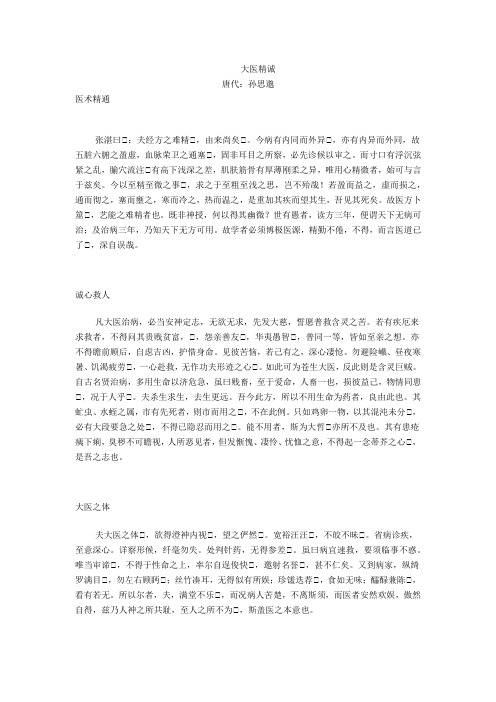
大医精诚唐代:孙思邈医术精通张湛曰⑴:夫经方之难精⑴,由来尚矣⑴。
今病有内同而外异⑴,亦有内异而外同,故五脏六腑之盈虚,血脉荣卫之通塞⑴,固非耳目之所察,必先诊候以审之。
而寸口有浮沉弦紧之乱,腧穴流注⑴有高下浅深之差,肌肤筋骨有厚薄刚柔之异,唯用心精微者,始可与言于兹矣。
今以至精至微之事⑴,求之于至粗至浅之思,岂不殆哉!若盈而益之,虚而损之,通而彻之,塞而壅之,寒而冷之,热而温之,是重加其疾而望其生,吾见其死矣。
故医方卜筮⑴,艺能之难精者也。
既非神授,何以得其幽微?世有愚者,读方三年,便谓天下无病可治;及治病三年,乃知天下无方可用。
故学者必须博极医源,精勤不倦,不得,而言医道已了⑴,深自误哉。
诚心救人凡大医治病,必当安神定志,无欲无求,先发大慈,誓愿普救含灵之苦。
若有疾厄来求救者,不得问其贵贱贫富,⑴,怨亲善友⑴,华夷愚智⑴,普同一等,皆如至亲之想。
亦不得瞻前顾后,自虑吉凶,护惜身命。
见彼苦恼,若己有之,深心凄怆。
勿避险巇、昼夜寒暑、饥渴疲劳⑴,一心赴救,无作功夫形迹之心⑴。
如此可为苍生大医,反此则是含灵巨贼。
自古名贤治病,多用生命以济危急,虽曰贱畜,至于爱命,人畜一也,损彼益己,物情同患⑴,况于人乎⑴。
夫杀生求生,去生更远。
吾今此方,所以不用生命为药者,良由此也。
其虻虫、水蛭之属,市有先死者,则市而用之⑴,不在此例。
只如鸡卵一物,以其混沌未分⑴,必有大段要急之处⑴,不得已隐忍而用之⑴。
能不用者,斯为大哲⑴亦所不及也。
其有患疮痍下痢,臭秽不可瞻视,人所恶见者,但发惭愧、凄怜、忧恤之意,不得起一念蒂芥之心⑴,是吾之志也。
大医之体夫大医之体⑴,欲得澄神内视⑴,望之俨然⑴。
宽裕汪汪⑴,不皎不昧⑴。
省病诊疾,至意深心。
详察形候,纤毫勿失。
处判针药,无得参差⑴。
虽曰病宜速救,要须临事不惑。
唯当审谛⑴,不得于性命之上,率尔自逞俊快⑴,邀射名誉⑴,甚不仁矣。
又到病家,纵绮罗满目⑴,勿左右顾眄⑴;丝竹凑耳,无得似有所娱;珍馐迭荐⑴,食如无味;醽醁兼陈⑴,看有若无。
大医精诚演讲稿英文版范文

Ladies and gentlemen,Good morning! It is my great honor to stand here before you today to deliver a speech on the profound art of medicine. As we all know, medicine is not just a profession, but an art that requires honesty and perfection. Today, I would like to share with you the essence of "Da Yi Jing Cheng" – the concept of great doctors with integrity and excellence.Firstly, let me introduce the origin of "Da Yi Jing Cheng". This concept was proposed by Zhang Zhongjing, a famous physician during the Eastern Han Dynasty in China. He believed that a great doctor should possess both integrity and expertise in order to cure diseases and save lives. This philosophy has been passed down from generation to generation and has become an important part of Chinese medical ethics.The first aspect of "Da Yi Jing Cheng" is honesty. A great doctor should be honest in their words and actions. They should never deceive patients or their families. In medical practice, honesty is the cornerstone of trust. When patients and their families trust their doctors, they are more likely to cooperate and follow the treatment plan. Therefore, honesty is essential for a great doctor to establish a good relationship with their patients.In addition to honesty, a great doctor should also possess the art of diagnosis. Diagnosis is the key to treatment, and an accurate diagnosis can save a patient's life. However, diagnosis is not merely a matter of knowledge and skills, but also a matter of heart. A great doctor should be able to empathize with their patients and understand their suffering. They should be able to listen to their patients' concerns and ask the right questions to gather the necessary information. Only by doing so can a doctor make a correct diagnosis and provide the best treatment plan.The second aspect of "Da Yi Jing Cheng" is perfection. A great doctor should always strive for perfection in their medical practice. They should be committed to continuous learning and self-improvement. Medicine is a constantly evolving field, and new discoveries andtechnologies are emerging every day. A great doctor should keep up with these advancements and incorporate them into their practice. They should be willing to explore alternative treatments and be open to new ideas.Moreover, a great doctor should also be compassionate and patient. Caring for patients is not just a job, but a mission. A great doctor should be able to comfort their patients during difficult times and provide them with hope. They should be willing to spend time with their patients, listen to their stories, and offer emotional support. In this way, a great doctor can help their patients heal not only physically but also mentally.In order to achieve "Da Yi Jing Cheng", a great doctor should also adhere to the principle of respect for life. They should understand the value of life and strive to save every life within their reach. In the face of terminal diseases, a great doctor should be able to provide compassionate care and support to their patients and their families, helping them face death with dignity.Ladies and gentlemen, the profound art of medicine is a journey of integrity and excellence. As medical professionals, we should constantly reflect on our practice and strive to be great doctors with integrity and perfection. Here are some suggestions for us to achieve this goal:1. Cultivate a sense of responsibility: As medical professionals, we have the responsibility to save lives and improve the quality of lifefor our patients. We should always remember this responsibility and work hard to fulfill it.2. Enhance our medical knowledge and skills: Continuous learning andself-improvement are essential for us to keep up with the rapid development of medicine. We should be willing to learn from others and be open to new ideas.3. Practice empathy and compassion: We should be able to understand and empathize with our patients' suffering. By offering emotional support, we can help them heal not only physically but also mentally.4. Adhere to ethical principles: We should always adhere to the ethical principles of medicine and strive to provide the best possible care for our patients.In conclusion, the profound art of medicine requires honesty and perfection. As medical professionals, we should strive to be great doctors with integrity and excellence. By following the principles of "Da Yi Jing Cheng", we can contribute to the betterment of human health and the advancement of medical science.Thank you for your attention!。
大医精诚原文及翻译
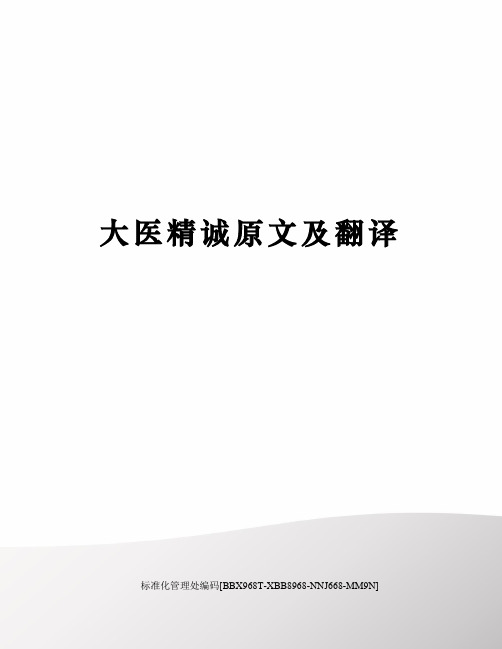
大医精诚原文及翻译标准化管理处编码[BBX968T-XBB8968-NNJ668-MM9N]大医精诚唐代:孙思邈医术精通张湛曰⑴:夫经方之难精⑵,由来尚矣⑶。
今病有内同而外异⑷,亦有内异而外同,故五脏六腑之盈虚,血脉荣卫之通塞⑸,固非耳目之所察,必先诊候以审之。
而寸口有浮沉弦紧之乱,腧穴流注⑹有高下浅深之差,肌肤筋骨有厚薄刚柔之异,唯用心精微者,始可与言于兹矣。
今以至精至微之事⑺,求之于至粗至浅之思,岂不殆哉!若盈而益之,虚而损之,通而彻之,塞而壅之,寒而冷之,热而温之,是重加其疾而望其生,吾见其死矣。
故医方卜筮⑻,艺能之难精者也。
既非神授,何以得其幽微世有愚者,读方三年,便谓天下无病可治;及治病三年,乃知天下无方可用。
故学者必须博极医源,精勤不倦,不得,而言医道已了⑼,深自误哉。
诚心救人凡大医治病,必当安神定志,无欲无求,先发大慈,誓愿普救含灵之苦。
若有疾厄来求救者,不得问其贵贱贫富,⑴,怨亲善友⑵,华夷愚智⑶,普同一等,皆如至亲之想。
亦不得瞻前顾后,自虑吉凶,护惜身命。
见彼苦恼,若己有之,深心凄怆。
勿避险巇、昼夜寒暑、饥渴疲劳⑷,一心赴救,无作功夫形迹之心⑸。
如此可为苍生大医,反此则是含灵巨贼。
自古名贤治病,多用生命以济危急,虽曰贱畜,至于爱命,人畜一也,损彼益己,物情同患⑹,况于人乎⑺。
夫杀生求生,去生更远。
吾今此方,所以不用生命为药者,良由此也。
其虻虫、水蛭之属,市有先死者,则市而用之⑻,不在此例。
只如鸡卵一物,以其混沌未分⑼,必有大段要急之处⑽,不得已隐忍而用之⑾。
能不用者,斯为大哲⑿亦所不及也。
其有患疮痍下痢,臭秽不可瞻视,人所恶见者,但发惭愧、凄怜、忧恤之意,不得起一念蒂芥之心⒀,是吾之志也。
大医之体夫大医之体⑴,欲得澄神内视⑵,望之俨然⑶。
宽裕汪汪⑷,不皎不昧⑸。
省病诊疾,至意深心。
详察形候,纤毫勿失。
处判针药,无得参差⑹。
虽曰病宜速救,要须临事不惑。
唯当审谛⑺,不得于性命之上,率尔自逞俊快⑻,邀射名誉⑼,甚不仁矣。
大医精诚原文及译文对照
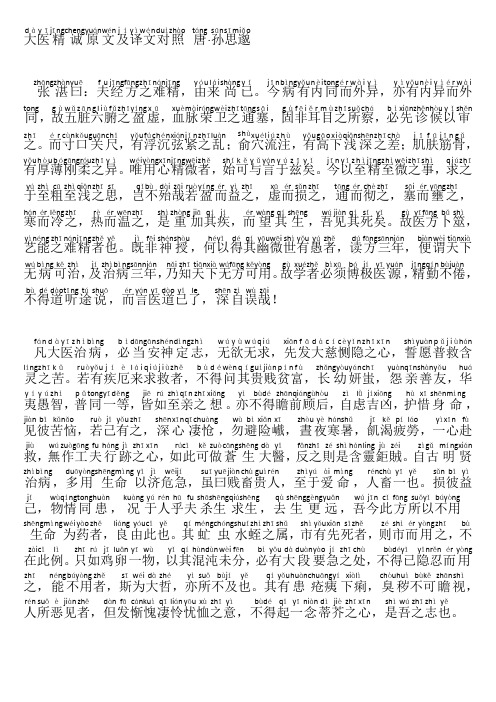
大d à医y ī精诚j īngcheng 原文yu ánw én 及j í译文y ìw én 对照du ìzh ào 唐t áng ·孙思邈s ūns īmi ǎo张zh āng 湛zh àn 曰yu ē:夫f u 经方j īngf āng 之zh ī难n án 精j īng ,由来y óu l ái 尚sh àng 已y ǐ。
今j īn 病b ìng 有y ǒu 内n èi 同tong 而外ér w ài 异y ì,亦y ì有y ǒu 内n èi 异y ì而外ér w ài 同tong,故g ù五脏六腑w ǔz ān g l i ùf ǔ之zh ī盈y íng 虚x ū,血脉xu èm ài 荣r óng 卫w èi 之zh ī通t ōng 塞s āi ,固g ù非f ēi 耳目ěr m ù之zh ī所su ǒ察ch á,必b ì先xi ān 诊zh ěn 候h òu 以y ǐ审sh ěn 之zh ī。
而ér 寸口c ùnk ǒu 关gu ān 尺ch ǐ,有y ǒu 浮沉f úch én 弦xi án 紧j ǐn 之zh ī乱lu àn ;俞sh ù穴xu é流注l i úz h ù,有y ǒu 高下g āoxi à浅qi ǎn 深sh ēn 之zh ī差ch à;肌肤j īf ū筋骨j īn g ǔ,有y ǒu 厚薄h òu b ó刚柔g āngr óu 之zh ī异y ì。
大医精诚原文及翻译

大医精诚原文及翻译《大医精诚》是唐代医学家孙思邈所著之经典篇章,论述了为医者应有的品德和行为准则,对后世医学伦理的发展产生了深远影响。
原文如下:张湛曰:“夫经方之难精,由来尚矣。
”今病有内同而外异,亦有内异而外同,故五脏六腑之盈虚,血脉荣卫之通塞,固非耳目之所察,必先诊候以审之。
而寸口关尺,有浮沉弦紧之乱;俞穴流注,有高下浅深之差;肌肤筋骨,有厚薄刚柔之异。
唯用心精微者,始可与言于兹矣。
今以至精至微之事,求之于至粗至浅之思,其不殆哉!若盈而益之,虚而损之,通而彻之,塞而壅之,寒而冷之,热而温之,是重加其疾,而望其生,吾见其死矣。
故医方卜筮,艺能之难精者也。
既非神授,何以得其幽微?世有愚者,读方三年,便谓天下无病可治;及治病三年,乃知天下无方可用。
故学者必须博极医源,精勤不倦,不得道听途说,而言医道已了,深自误哉!凡大医治病,必当安神定志,无欲无求,先发大慈恻隐之心,誓愿普救含灵之苦。
若有疾厄来求救者,不得问其贵贱贫富,长幼妍蚩,怨亲善友,华夷愚智,普同一等,皆如至亲之想。
亦不得瞻前顾后,自虑吉凶,护惜身命。
见彼苦恼,若己有之,深心凄怆。
勿避险巇、昼夜寒暑、饥渴疲劳,一心赴救,无作功夫形迹之心。
如此可为苍生大医,反此则是含灵巨贼。
自古名贤治病,多用生命以济危急,虽曰贱畜贵人,至于爱命,人畜一也。
损彼益己,物情同患,况于人乎!夫杀生求生,去生更远。
吾今此方,所以不用生命为药者,良由此也。
其虻虫、水蛭之属,市有先死者,则市而用之,不在此例。
只如鸡卵一物,以其混沌未分,必有大段要急之处,不得已隐忍而用之。
能不用者,斯为大哲,亦所不及也。
其有患疮痍下痢,臭秽不可瞻视,人所恶见者,但发惭愧凄怜忧恤之意,不得起一念蒂芥之心,是吾之志也。
夫大医之体,欲得澄神内视,望之俨然。
宽裕汪汪,不皎不昧。
省病诊疾,至意深心。
详察形候,纤毫勿失。
处判针药,无得参差。
虽曰病宜速救,要须临事不惑。
唯当审谛覃思,不得于性命之上,率尔自逞俊快,邀射名誉,甚不仁矣!又到病家,纵绮罗满目,丝竹凑耳,珍羞迭荐,不可顾也;而白刃加于前,汤火临于后,亦不可畏也。
大医精诚原文及翻译
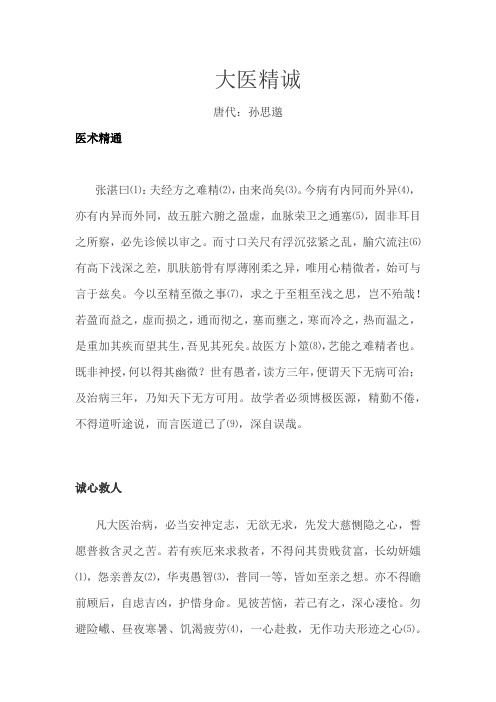
大医精诚唐代:孙思邈医术精通张湛曰⑴:夫经方之难精⑵,由来尚矣⑶。
今病有内同而外异⑷,亦有内异而外同,故五脏六腑之盈虚,血脉荣卫之通塞⑸,固非耳目之所察,必先诊候以审之。
而寸口关尺有浮沉弦紧之乱,腧穴流注⑹有高下浅深之差,肌肤筋骨有厚薄刚柔之异,唯用心精微者,始可与言于兹矣。
今以至精至微之事⑺,求之于至粗至浅之思,岂不殆哉!若盈而益之,虚而损之,通而彻之,塞而壅之,寒而冷之,热而温之,是重加其疾而望其生,吾见其死矣。
故医方卜筮⑻,艺能之难精者也。
既非神授,何以得其幽微?世有愚者,读方三年,便谓天下无病可治;及治病三年,乃知天下无方可用。
故学者必须博极医源,精勤不倦,不得道听途说,而言医道已了⑼,深自误哉。
诚心救人凡大医治病,必当安神定志,无欲无求,先发大慈恻隐之心,誓愿普救含灵之苦。
若有疾厄来求救者,不得问其贵贱贫富,长幼妍媸⑴,怨亲善友⑵,华夷愚智⑶,普同一等,皆如至亲之想。
亦不得瞻前顾后,自虑吉凶,护惜身命。
见彼苦恼,若己有之,深心凄怆。
勿避险巇、昼夜寒暑、饥渴疲劳⑷,一心赴救,无作功夫形迹之心⑸。
如此可为苍生大医,反此则是含灵巨贼。
自古名贤治病,多用生命以济危急,虽曰贱畜贵人,至于爱命,人畜一也,损彼益己,物情同患⑹,况于人乎⑺。
夫杀生求生,去生更远。
吾今此方,所以不用生命为药者,良由此也。
其虻虫、水蛭之属,市有先死者,则市而用之⑻,不在此例。
只如鸡卵一物,以其混沌未分⑼,必有大段要急之处⑽,不得已隐忍而用之⑾。
能不用者,斯为大哲⑿亦所不及也。
其有患疮痍下痢,臭秽不可瞻视,人所恶见者,但发惭愧、凄怜、忧恤之意,不得起一念蒂芥之心⒀,是吾之志也。
大医之体夫大医之体⑴,欲得澄神内视⑵,望之俨然⑶。
宽裕汪汪⑷,不皎不昧⑸。
省病诊疾,至意深心。
详察形候,纤毫勿失。
处判针药,无得参差⑹。
虽曰病宜速救,要须临事不惑。
唯当审谛覃思⑺,不得于性命之上,率尔自逞俊快⑻,邀射名誉⑼,甚不仁矣。
又到病家,纵绮罗满目⑽,勿左右顾眄⑾;丝竹凑耳,无得似有所娱;珍馐迭荐⑿,食如无味;醽醁兼陈⒀,看有若无。
大医精诚――我的行医理念和行为准则
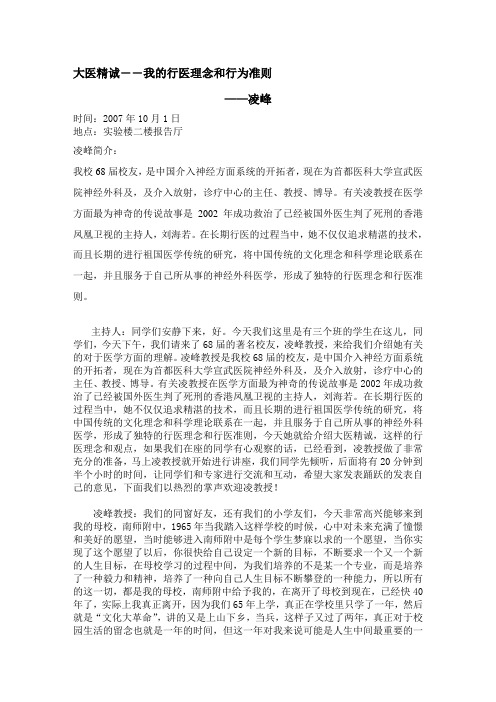
中医典籍《大医精诚》原文和译文
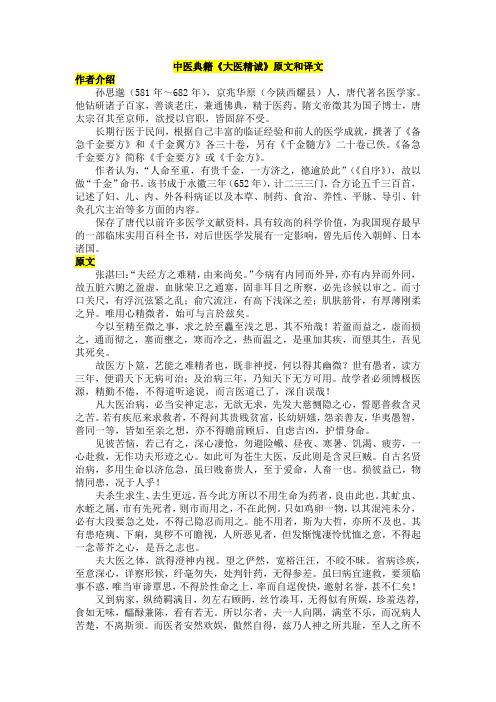
中医典籍《大医精诚》原文和译文作者介绍孙思邈(581年~682年),京兆华原(今陕西耀县)人,唐代著名医学家。
他钻研诸子百家,善谈老庄,兼通佛典,精于医药。
隋文帝徵其为国子博士,唐太宗召其至京师,欲授以官职,皆固辞不受。
长期行医于民间,根据自己丰富的临证经验和前人的医学成就,撰著了《《备急千金要方》和《千金翼方》各三十卷,另有《千金髓方》二十卷已佚。
《备急千金要方》简称《千金要方》或《千金方》。
作者认为,“人命至重,有贵千金,一方济之,德逾於此”(《自序》),故以做《“千金”命书。
该书成于永徽三年《(652年),计二三三门,合方论五千三百首,记述了妇、儿、内、外各科病证以及本草、制药、食治、养性、平脉、导引、针灸孔穴主治等多方面的内容。
保存了唐代以前许多医学文献资料,具有较高的科学价值,为我国现存最早的一部临床实用百科全书,对后世医学发展有一定影响,曾先后传入朝鲜、日本诸国。
原文张湛曰:《“夫经方之难精,由来尚矣。
”今病有内同而外异,亦有内异而外同,故五脏六腑之盈虚,血脉荣卫之通塞,固非耳目之所察,必先诊候以审之。
而寸口关尺,有浮沉弦紧之乱;俞穴流注,有高下浅深之差;肌肤筋骨,有厚薄刚柔之异。
唯用心精微者,始可与言於兹矣。
今以至精至微之事,求之於至麤至浅之思,其不殆哉!若盈而益之,虚而损之,通而彻之,塞而壅之,寒而冷之,热而温之,是重加其疾,而望其生,吾见其死矣。
故医方卜筮,艺能之难精者也,既非神授,何以得其幽微?世有愚者,读方三年,便谓天下无病可治;及治病三年,乃知天下无方可用。
故学者必须博极医源,精勤不倦,不得道听途说,而言医道已了,深自误哉!凡大医治病,必当安神定志,无欲无求,先发大慈恻隐之心,誓愿普救含灵之苦。
若有疾厄来求救者,不得问其贵贱贫富,长幼妍媸,怨亲善友,华夷愚智,普同一等,皆如至亲之想,亦不得瞻前顾后,自虑吉凶,护惜身命。
见彼苦恼,若己有之,深心凄怆,勿避险巇、昼夜、寒暑、饥渴、疲劳,一心赴救,无作功夫形迹之心。
大医精诚原文及翻译
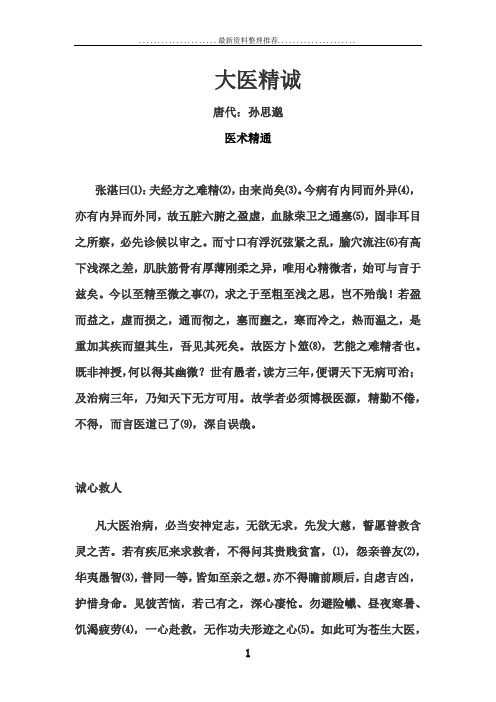
大医精诚唐代:孙思邈医术精通张湛曰⑴:夫经方之难精⑵,由来尚矣⑶。
今病有内同而外异⑷,亦有内异而外同,故五脏六腑之盈虚,血脉荣卫之通塞⑸,固非耳目之所察,必先诊候以审之。
而寸口有浮沉弦紧之乱,腧穴流注⑹有高下浅深之差,肌肤筋骨有厚薄刚柔之异,唯用心精微者,始可与言于兹矣。
今以至精至微之事⑺,求之于至粗至浅之思,岂不殆哉!若盈而益之,虚而损之,通而彻之,塞而壅之,寒而冷之,热而温之,是重加其疾而望其生,吾见其死矣。
故医方卜筮⑻,艺能之难精者也。
既非神授,何以得其幽微?世有愚者,读方三年,便谓天下无病可治;及治病三年,乃知天下无方可用。
故学者必须博极医源,精勤不倦,不得,而言医道已了⑼,深自误哉。
诚心救人凡大医治病,必当安神定志,无欲无求,先发大慈,誓愿普救含灵之苦。
若有疾厄来求救者,不得问其贵贱贫富,⑴,怨亲善友⑵,华夷愚智⑶,普同一等,皆如至亲之想。
亦不得瞻前顾后,自虑吉凶,护惜身命。
见彼苦恼,若己有之,深心凄怆。
勿避险巇、昼夜寒暑、饥渴疲劳⑷,一心赴救,无作功夫形迹之心⑸。
如此可为苍生大医,反此则是含灵巨贼。
自古名贤治病,多用生命以济危急,虽曰贱畜,至于爱命,人畜一也,损彼益己,物情同患⑹,况于人乎⑺。
夫杀生求生,去生更远。
吾今此方,所以不用生命为药者,良由此也。
其虻虫、水蛭之属,市有先死者,则市而用之⑻,不在此例。
只如鸡卵一物,以其混沌未分⑼,必有大段要急之处⑽,不得已隐忍而用之⑾。
能不用者,斯为大哲⑿亦所不及也。
其有患疮痍下痢,臭秽不可瞻视,人所恶见者,但发惭愧、凄怜、忧恤之意,不得起一念蒂芥之心⒀,是吾之志也。
大医之体夫大医之体⑴,欲得澄神内视⑵,望之俨然⑶。
宽裕汪汪⑷,不皎不昧⑸。
省病诊疾,至意深心。
详察形候,纤毫勿失。
处判针药,无得参差⑹。
虽曰病宜速救,要须临事不惑。
唯当审谛⑺,不得于性命之上,率尔自逞俊快⑻,邀射名誉⑼,甚不仁矣。
又到病家,纵绮罗满目⑽,勿左右顾眄⑾;丝竹凑耳,无得似有所娱;珍馐迭荐⑿,食如无味;醽醁兼陈⒀,看有若无。
大医精诚――我的行医理念和行为准则

《大医精诚》原文、注音及翻译
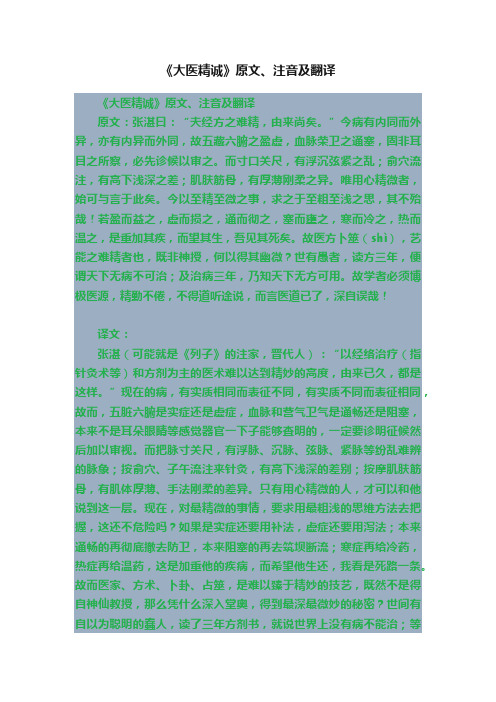
《大医精诚》原文、注音及翻译《大医精诚》原文、注音及翻译原文:张湛曰:“夫经方之难精,由来尚矣。
”今病有内同而外异,亦有内异而外同,故五藏六腑之盈虚,血脉荣卫之通塞,固非耳目之所察,必先诊候以审之。
而寸口关尺,有浮沉弦紧之乱;俞穴流注,有高下浅深之差;肌肤筋骨,有厚薄刚柔之异。
唯用心精微者,始可与言于此矣。
今以至精至微之事,求之于至粗至浅之思,其不殆哉!若盈而益之,虚而损之,通而彻之,塞而壅之,寒而冷之,热而温之,是重加其疾,而望其生,吾见其死矣。
故医方卜筮(shì),艺能之难精者也,既非神授,何以得其幽微?世有愚者,读方三年,便谓天下无病不可治;及治病三年,乃知天下无方可用。
故学者必须博极医源,精勤不倦,不得道听途说,而言医道已了,深自误哉!译文:张湛(可能就是《列子》的注家,晋代人):“以经络治疗(指针灸术等)和方剂为主的医术难以达到精妙的高度,由来已久,都是这样。
”现在的病,有实质相同而表征不同,有实质不同而表征相同,故而,五脏六腑是实症还是虚症,血脉和营气卫气是通畅还是阻塞,本来不是耳朵眼睛等感觉器官一下子能够查明的,一定要诊明征候然后加以审视。
而把脉寸关尺,有浮脉、沉脉、弦脉、紧脉等纷乱难辨的脉象;按俞穴、子午流注来针灸,有高下浅深的差别;按摩肌肤筋骨,有肌体厚薄、手法刚柔的差异。
只有用心精微的人,才可以和他说到这一层。
现在,对最精微的事情,要求用最粗浅的思维方法去把握,这还不危险吗?如果是实症还要用补法,虚症还要用泻法;本来通畅的再彻底撤去防卫,本来阻塞的再去筑坝断流;寒症再给冷药,热症再给温药,这是加重他的疾病,而希望他生还,我看是死路一条。
故而医家、方术、卜卦、占筮,是难以臻于精妙的技艺,既然不是得自神仙教授,那么凭什么深入堂奥,得到最深最微妙的秘密?世间有自以为聪明的蠢人,读了三年方剂书,就说世界上没有病不能治;等到行医治病三年,才知道世界上的病没有现成的方剂可用。
故而学医的人必须广博地深入地探究各种医学的来源,精心、勤勉,孜孜不倦,不可以根据道听途说,而宣称对医道已了然于胸,深深地贻误自己。
- 1、下载文档前请自行甄别文档内容的完整性,平台不提供额外的编辑、内容补充、找答案等附加服务。
- 2、"仅部分预览"的文档,不可在线预览部分如存在完整性等问题,可反馈申请退款(可完整预览的文档不适用该条件!)。
- 3、如文档侵犯您的权益,请联系客服反馈,我们会尽快为您处理(人工客服工作时间:9:00-18:30)。
Medical EthicsZhang Zhan, a famous scholar in the Eastern Jin Dynasty, said: “To master the classics of medicine is difficult and the difficulty is long-standing.” Nowadays diseases are sometimes interiorly the same but exteriorly different, and sometimes interiorly different but exteriorly the same. Thus it is difficult to examine the conditions of the five Zang-organs and the six Fu-organs as well as the circulation of the blood, nutrient Qi and defensive Qi simply by means of listening and observation. It is necessary that the pulse be taken to make an accurate diagnosis. However, the Cun, Guan and Chi divisions of the Cunkou (the pulsation of the radial artery) may be either floating, or sunken, or taut, or tense; the circulation of Qi and blood through the acupoints may be either upward, or downward, or shallow, or deep; the skin, muscle and bones may be either thick, or thin, or strong, or weak. Only those who are very cautious and conscientious can be discussed with such an abstruse theory.However some unqualified doctors nowadays study such a profound and excellent theory with very simple and crude thinking. Is not it dangerous? If sthenia syndrome is treated with nourishing therapy, asthenia syndrome with purging therapy, incontinence with drainage therapy, constipation with blockage therapy, cold syndrome with cold therapy and heat syndrome with warm therapy, it will undoubtedly worsen the disease. Those quack doctors may hope to save the patients in such a way, but I believe that the patients treated will certainly die. That is why the knowledge of medicine and divination are very difficult to be mastered. Without the inspiration of the immortals, how could one understand the profound theory of medicine!Nowadays some ignorant people who have studied medicine for just three years claim that no disease is incurable to them. However, after three years of practice, they have begun to realize that no prescriptions are applicable. So those who are ready to devote themselves to medicine must try to search for the origin of medicine and work hard in their studies. They should not believe hearsay. If they think that they have mastered all the knowledge of medicine, then they will surely mislead themselves.When great doctors treat patients, they are usually calm and concentrated without any desire and avarice. They have great sympathy with the patients and are determined to save the people from suffering. If the patients come to ask for help, they would not treat them differently by seeing whether they are rich or poor, old or young, beautiful or ugly, enemy or friends, Chinese or foreigners and foolish or intelligent. They would treat all the patients like their close relatives. In treating patients, they would not think over and over for themselves and pay too much attention to the protection of their own life. Being doctors, they should regard patients’ suffering as their own and have deep sympathy with them. Confronted with danger, they should not try to avoid it. No matter in the daytime or night and in winter or summer, and no matter when they are hungry or thirsty and tired or exhausted, they should work for the patients heart and soul without any delay and contemplation for personal gain or loss. Only by doing so can one become a great doctor for the people. Otherwise he will surely become a scourge of the people.From the ancient times, celebrated doctors treated patients by using the live animals. Although it is believed that animals are humble and human beings are noble. However in terms of the love for life, human beings and animals are the same. To kill one for the saving of another is regarded as a disaster even in the animal world, let alone human beings! To kill animals to save human beings actually deviates from the right way of saving life. That is why the prescriptions recorded in my book have excluded the use of live animals. Some insects, like horsefly and leech which were dead before being sold on the market, can be bought and used in prescriptions. Thisdoes not include in what is mentioned above. The only exception is the egg which is in chaos and can only be used under emergency as a last resort. Those who do not make use of it are the true great doctors. I myself can never come up to such a high standard. Sometimes patients are suffering from scabies or dysentery with foul smell and unpleasant sight appearing disgusted in the eyes of other people. But as a doctor, one should have deep sympathy with the patients and not be weary in any way. That is what I wish to do.A great doctor should be easy in manner, quiet in spirit, strict in self-examination, noble in appearance, magnanimous in breadth of mind and neither supercilious nor obsequious in manner. In collecting pathological information and diagnosing disease, the doctor should pay great attention to distinguishing syndromes without any errors and deciding treatment with great accuracy. It is true that a disease must be treated as immediately as possible. However in actual practice, the doctor has to keep calm in emergency and takes all factors into consideration in making diagnosis and performing treatment. In dealing with the life of the patients, the doctor should try to avoid showing off and building up reputation for himself, because that is absolutely immoral. When entering into the patient’s home full of beautiful things, he should never cast his glance about. When the musical sound played around, he should not appear entertained; when delicious food is served, he should feel tasteless; and even when mellow wine is offered, he should keep undistracted. Why I emphasize this? Because one person’s suffering will make the whole family said, let alone the suffering of a patient which is constant. Under such a situation, if the doctor indulges himself in entertainment and appears self-important, he will be condemned by both human beings and the immortals. The great doctors with high morality never behave that way because this is just where medical tenets lie in.Besides, being a doctor, one should never talk extravagantly, laugh uproariously, gossip at length, speak about others, show off oneself, slander other doctors and boast his own ability. Once accidentally curing a patient, one may put on airs, appear proud or feel unequalled. All that mentioned above is the most serious diseases that doctors tend to develop.Therefore doctors should never try to use their techniques to make money for themselves, but always have great sympathy with the patients. When they have finally entered the other world, they will feel much happier. Furthermore, doctors should never prescribe the rich patients with precious drugs difficult to collect for the purpose of showing off his own talent. This behaviour, undoubtedly, does not agree with the ideas of humanity and virtue. Since I am determined to devote myself to saving the lives of the people, I have put forward some suggestions in the above for doctors to follow. I think that those who devote themselves to medicine will not regard what I have said as nonsense.。
